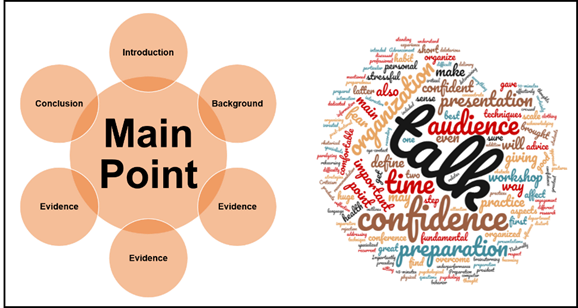Workshop recap
Communicating Science 101: How to Overcome Fear of Giving Research Presentations
- Helena Mello, Ph.D. student, Multidisciplinary Ph.D. program
The Alliance for Career Advancement proudly hosted Chalk Talk Science (CTS) an independent nonprofit organization dedicated to helping scientists become better communicators. Dennis Mangan, Ph.D., director of CTS, presented a workshop to graduate students and post-doctoral fellows on how to overcome fear of giving research presentations.
This workshop discussed the difficulties researchers face when trying to communicate their science. It can be difficult to concentrate on simple tasks, and even to sleep at night. Not only this behavior can be deleterious to our physical health, but it might also affect our mental health. With such difficulty, giving a talk becomes a huge obstacle rather than a common way of sharing information with our peers.
During his talk Dr. Mangan shared techniques to help the audience get over the fear of speaking. Step 1: Define what we are afraid of when giving a public talk. Step 2: Define how bad your fear is on a scale of 1 to 10 (lowest to highest). Note: If the fear exceeds higher than 8 or 9, it is critical to seek for specialized help. Feelings of fear may be paralyzing and affect several aspects of professional and personal life. Step 3: Prepare and define your main point based on who your audience is and how much time you have to present. Step 4: Organize your thoughts around the topic you will present (i.e. bullet points, Step 5: Practice, Practice, Practice |
An important aspect of a good presentation is audience engagement. There are a few tricks to make sure your audience is invested on your talk. You can make rhetorical questions (“Does that make sense? Do you understand what I’m saying?”), and make a short pause for reflection (and perhaps take a sip of water). Pauses, intonation, and even the pace of your speech have great influence on the attention you get from the audience. In addition, your body language, gestures, clothing, and eye-contact, also have an effect on the delivery of your presentation. Therefore, the habit of recording your practices can be a huge aid in effectively addressing faults and getting more confident for the big day.
Another interesting point made by Dr. Mangan was not overdoing one’s presentation. Presenters often tend to lean towards presenting an avalanche of information which could lead to anxiety about presentation timing. Dr. Mangan suggested distilling the information so one can focus on the topics at hand and deliver a sound message to the audience.
Finally, the greatest recommendation for a good presentation is confidence. In fact, all that we have discussed are strategies for becoming comfortable and confident when giving a talk. If you can prepare, organize, and practice for a presentation, you will certainly be more confident about it, and also very proud of your work.

Tip: Outlining and brainstorming are ways of organizing your thoughts
around the central point of your talk.
|
This article was written by Helena Mello, Ph.D. student in the Department of Microbiology. Helena studies herpes virus reactivation and its connection to a cellular process termed autophagy. As an enthusiast of Science Education, she participates in a number of outreach programs for middle and high schools students. She is also a writer and editor for the Rutgers iJOBS Blog since 2018 where she blogs on STEM careers outside of academia. |
Rutgers is an equal access/equal opportunity institution. Individuals with disabilities are encouraged to direct suggestions, comments, or complaints concerning any accessibility issues with Rutgers websites to accessibility@rutgers.edu or complete the Report Accessibility Barrier / Provide Feedback form.